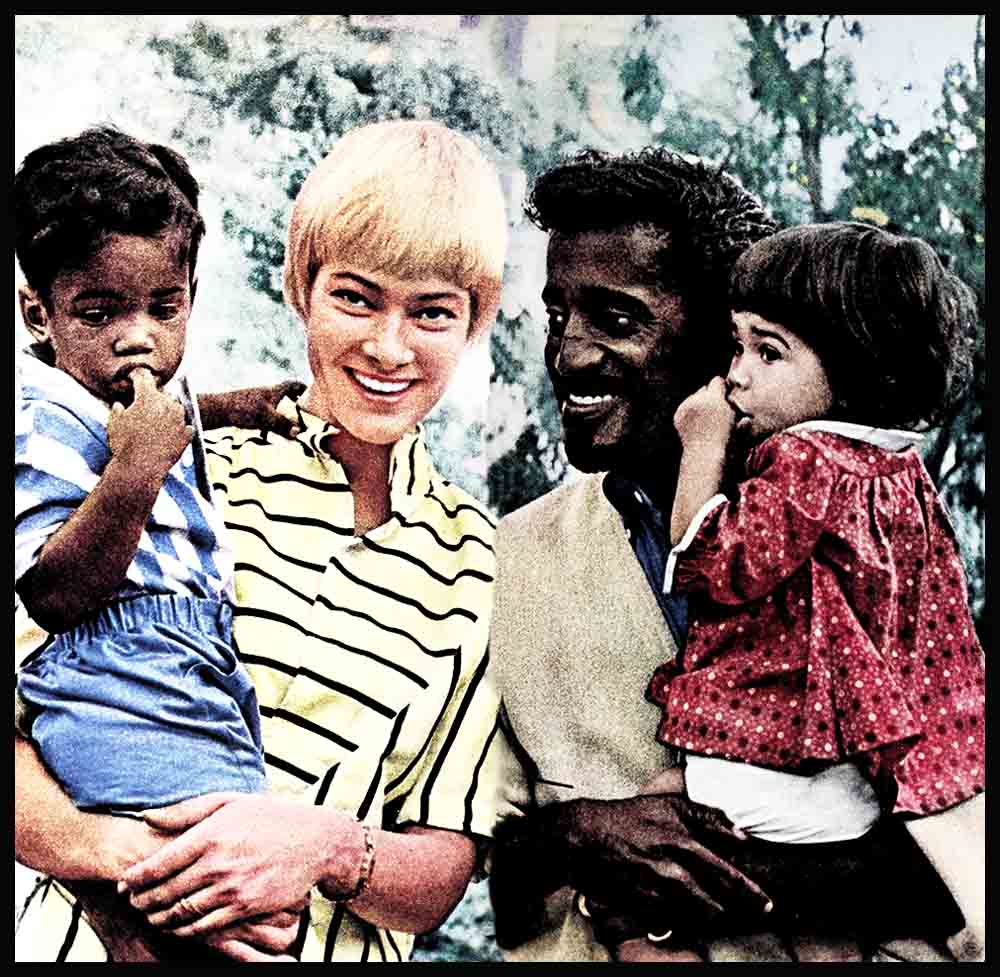
An Exclusive Interview With Sammy Davis, Jr.
This exclusive interview with Sammy Davis was taped by Fred Robbins, nationally known radio and TV personality whose syndicated celebrity interview show, “Assignment Hollywood,” is heard on weekdays from Coast to Coast, and also in Canada and in Europe on Radio Luxembourg.
FRED: Well, Sammy, neither snow, nor sleet, nor dark of night can keep PHOTOPLAY from getting to you—so here we are in Cleveland in the middle of the worst snow storm in years. So how are you?
SAMMY: Pretty good, Fred.
FRED: And how does it feel to have a hit record?
SAMMY: It took a great song to do it and a lot of belief in the song. I loved the point of view of “What Kind of Fool Am I?” It’s a great lyric.
FRED: It seems that you’ve got a deep appreciation of not only the lyrics but of life itself. Sammy, being a daddy and the head of a family now. It’s matured you a lot, hasn’t it?
SAMMY: Well. I think you can’t help being matured by it, Fred. I really do. We all must grow at one time or another. We all have circumstances that make us grow. I think with the advent of my wife and my two kids, the fact of the responsibilities involved today become very important to me, because I want them to be happy.
AUDIO BOOK
FRED: I saw you buying toys early this afternoon for Mark and Tracy. What kind?
SAMMY: Well, they have a whole chest full of toys that they’ll never use. I always bring back things—the toys I bought for Mark today I’m not going to let him have, because it’s too dangerous for him to have. That’s a problem today. I think toys should be made so the kids can have fun with them and not get hurt. It’s a cannon, with a projectile shell that goes off and everything, and it comes out looking like a real bullet. And it comes out almost as fast. He would be running around shooting the thing and you know. you might have an accident in the house with a thing like that.
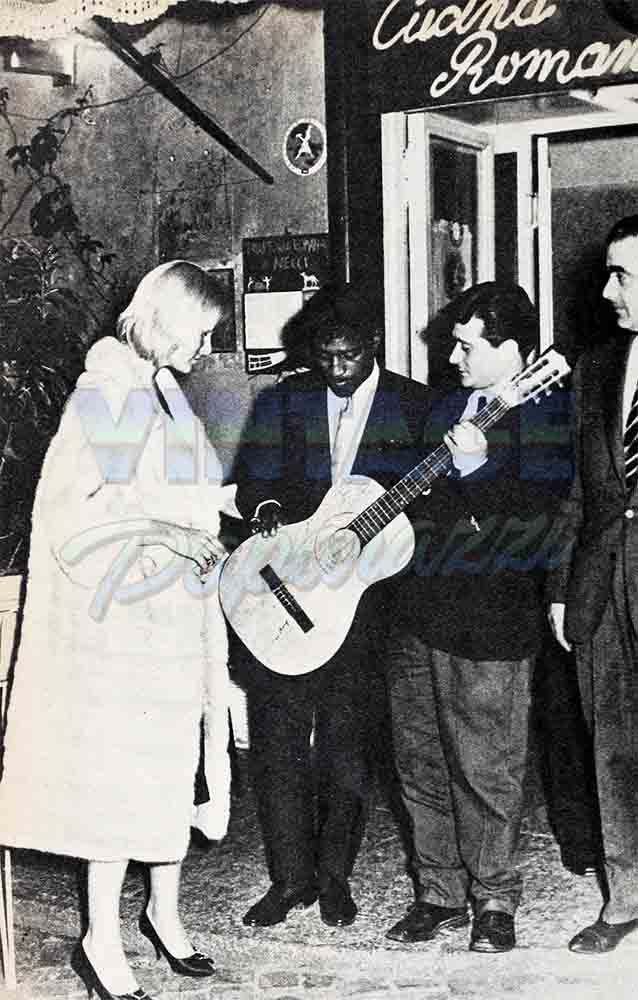
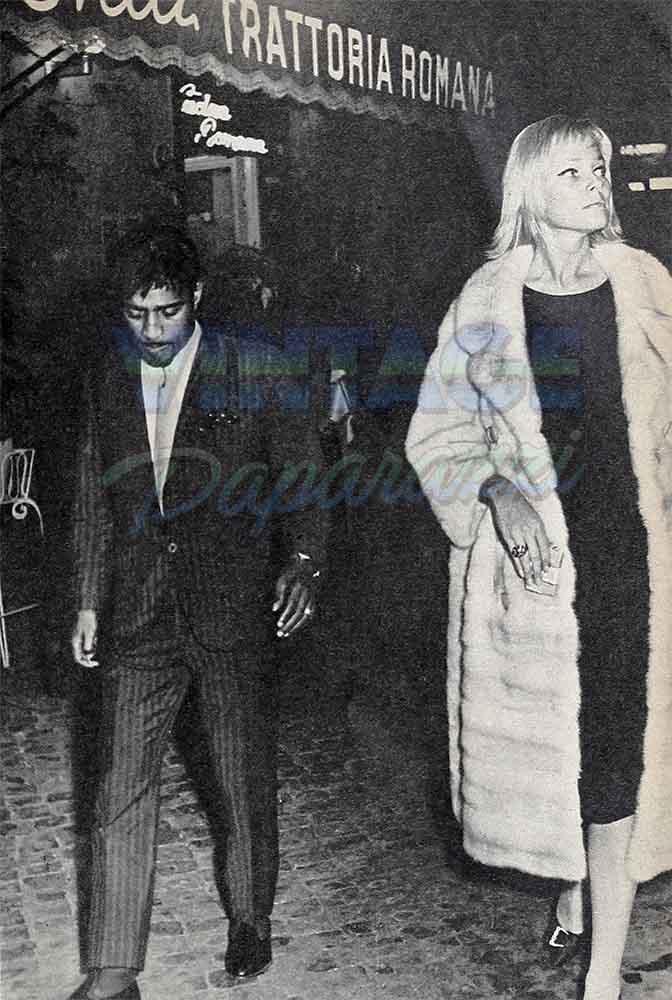
FRED: What’s Tracy’s favorite toy, Sammy?
SAMMY: Anything that makes noise. She can take a spoon and beat in on the table. That’s her favorite toy.
FRED: How about Mark? What toy does he prefer?
SAMMY: Well, both kids have just about everything there is. But they seem to like fire trucks and cardboard boxes—getting in and out. And Mark, he’s a runner. He runs around a lot. He just runs straight across the room and then runs back again and runs skittering out of there and runs right back and falls down. And I gave him a little cap pistol. He goes “bang” at me and I always have to fail down, but when I shoot him he never falls down.
FRED: He doesn’t know that his daddy is the quickest draw in the west. east, north and south, does he?
SAMMY: No, but he’ll find out soon enough . . . We got Mark a two-month-old Great Dane puppy. Well, do I have to tell you what’s going on? The time the kids are (having with this dog! It’s too much! They can’t believe it’s ‘ a dog ’cause the one they have is an English pug—named ‘Sir Pug”—and they think all dogs are small. But this one’s a whole new world ’cause they can get on his back and try to ride him like a pony. It’s so funny. When Tracy wants to get off, she says, “all too,” meaning “all through.” She really hasn’t learned the meaning of words yet—she picks up the new ones so fast. She’ll say, “Down, Mommy,” when she wants to be taken out of her high chair, but when she wants to be picked up, she also says, “Down, Mommy.” She breaks me up with a little thing she does—the way she greets me. She moves her outspread little hand in front of her face, slowly, and says, “Hey there,” with such a smile you could just melt.
FRED: Do the kids like the swimming pool, Sam?
SAMMY: They love it. They go in mostly with May to splash around and stuff but it really looks like a marina. ’cause we’ve always got the toy motorboats going back and forth. This to me is a real ball. I think I have more fun than they do. We use the pool as a big tub, you might say. Believe it or not, I’m just learning to swim.
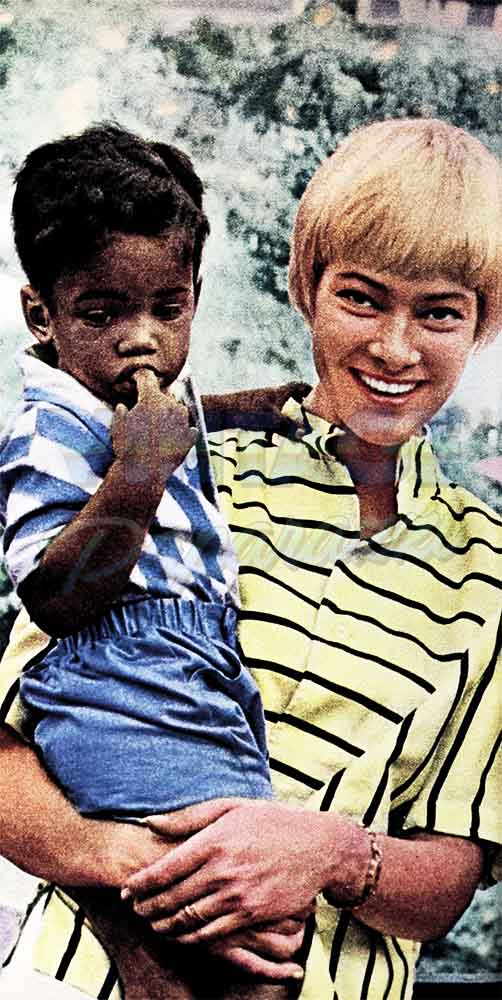

FRED: You do so many things, you mean to tell me you can’t swim? Not at all?
SAMMY: Well you know. Freddie, as a kid I never had time to swim or even to think about learning ’cause I was always working and on the road somewhere, and there were no pools on stage . . . that’s why it’s so wonderful having a home life now and being able to enjoy the things I never did before. I never played baseball like other kids, either. I’m just learning about it now.
FRED: I want to get a quick portrait of the home life, Sammy. What are the kids like? How do they get along together?
SAMMY: Like kids. There’s no difference, Fred. They are no different. I wish I could say that our house is different than it is in anybody else’s house that has two children because of the nature of the marriage, but there is none. There is no difference. The same things prevail. The kids run the house and my wife is constantly yelling at them and I’m yelling at them, and the noise is unbearable at times. But I think that prevails in everybody’s house, and I think the man who says, “Oh, it’s an orderly, beautiful house,” and goes on with that sort of story is full of donkey dust. I just don’t believe it. But I think even that in itself shows some of the fallacy that people have against marriages. If people are in love with each other and they want to get married, and they get married, they themselves will find the normal life they want to lead according to their strata, their structure.
FRED: How did you explain to Tracy that she had a new brother, when Mark came home?
SAMMY: We haven’t explained that yet, because you must remember that Tracy is only sixteen months old. When she got to the point of walking and be- coming really aware, Mark was already there. And that was one of the reasons— we wanted her to have a big brother to lean on. And as far as how we handle it, that will be handled in due time. You know, I don’t believe in kids having education into things that are not even on their minds at this point. But I can tell you as far as their relationship is concerned, that Mark protects Tracy tremendously and is always looking out after her, and it’s really a warm thing to watch.
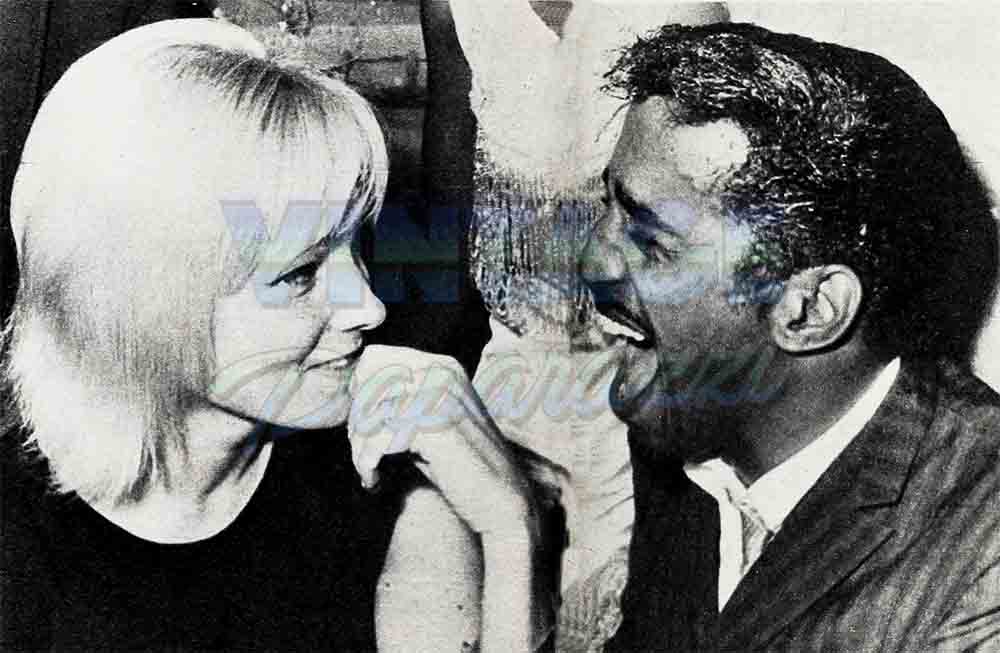
FRED: Then Mark acts the big brother role?
SAMMY: Oh. yeah—he’s very attentive and protective. He calls her “Tacy” and really keeps an eye on his sister. Like . . . our house is up in the Hollywood hills and the driveway leads right on to the road . . . so whenever he sees her walking that way, he follows her with a “No, no, Tacy!” and grabs her hand and leads her back up the driveway. He really loves her. Quite a little guy. You know how kids get attached to toy s. Well. Mark has a toy Thunderbird automobile—and he carries it with him everywhere. I mean to bed and everything. It’s like his trademark.
FRED: How do you handle these separations, when you’re on the road? Must be pretty rough on you.
SAMMY: It is, Fred. But you know, being on the road is my life’s blood. I mean this is how I make my living. I have a beautiful home in Hollywood, a wonderful wife—everything a man could want . . . But let’s face it—I can’t sit around there nine months a year waiting for a picture. Thank God, May understands this. Now can’t you just see her and the kids on a trip like this, one night in Cleveland with this twelve inches of snow here, and the train ride to Pittsburgh tomorrow, and then to Baltimore on the bus . . . with the kids. It’s just impossible to have the family along when we’re doing these one-nighters. But in Chicago she was with me for eight days, and when I’m at the Copa in New York the whole gang will be with me for the entire engagement. Actually, we’re never apart for more than a week or two at a time through the year.
FRED: I guess May likes being a mother, huh?
SAMMY: She’s just wonderful with kids, Fred. With our two—she’s very devoted and completely fair and is very careful about teaching them right from wrong. I mean. Tracy doesn’t get more time or attention than Mark. It’s like a campaign for the presidency in our house —equal time for everybody.
FRED: Does she believe in Progressive education? Giving the kids their way?
SAMMY: No, we don’t much go for that routine. I know a lot of families who’ve raised their children along that line . . . letting them do whatever they want in order not to repress them and give them anxieties . . . you know . . . like making little fires in the living room . . . or turning over furniture . . . or sawing the dog in half . . . but you know as well as I do that so many of these kids turn out to be spoiled brats. May doesn’t hesitate to give them a whack if they deserve it . . . I think that’s a lot better than this so called modern, Progressive bit.
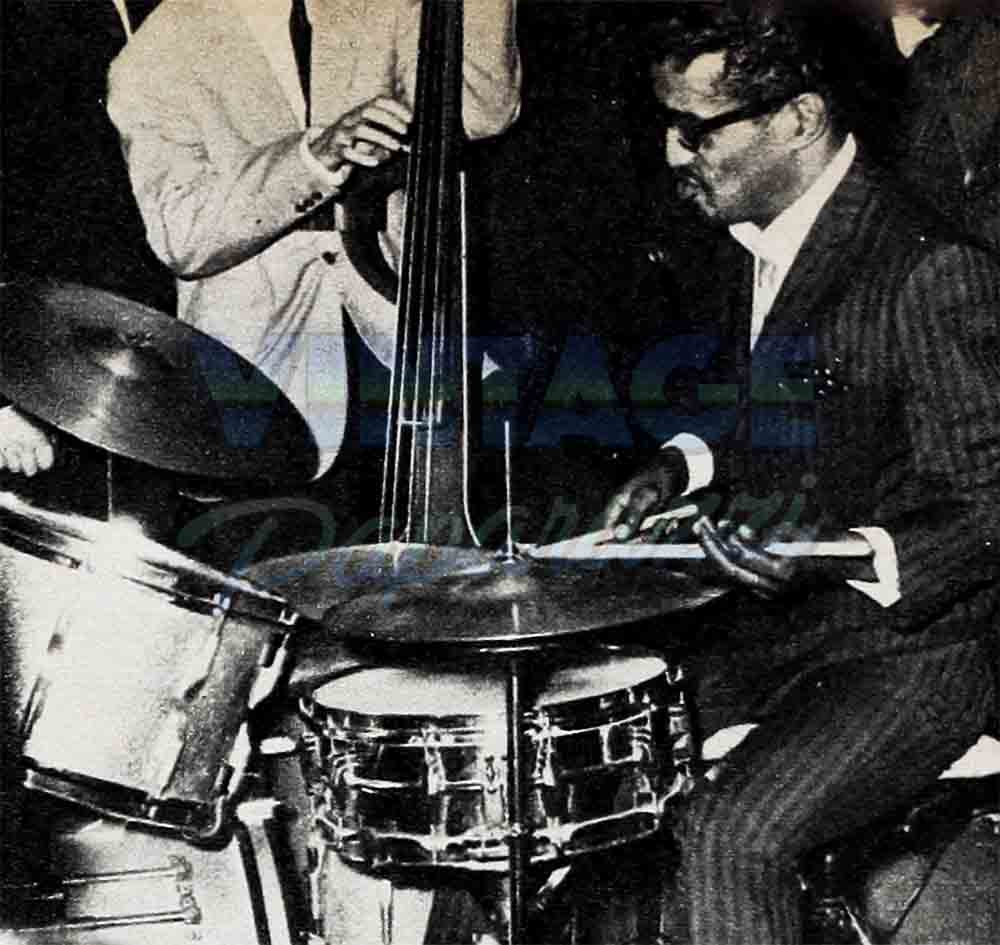
FRED: The old saying, “Spare the rod and spoil the child.”
SAMMY: That’s right. But she really is quite a mother. And it’s such a full time job—taking care of two kids, as any mother knows. There’s no sleeping late, either. Comes seven in the morning, and Tracy is up and I mean up . . . rocking her crib back and forth until her Mommy wakes up . . . and from then on until bedtime it’s a continuous performance . . . by then she’s really had it . . . but she loves every minute.
FRED: Sammy, what does it do to you inwardly to realize that you’re a daddy? Can you express maybe your feelings a little bit about being a father?
SAMMY: No. I don’t think that can be expressed. I think that is something that happens and I think the one word that you are suddenly very aware of is responsibility, of course. You can’t really become very articulate about it, because it’s something that each father must feel in his own right. As for me, I know that I have always loved children and I certainly idolize my own. I know what kind of life I want for them. I want them to lead a nice, healthy, good, normal life, to know the value of money, to make sure that they regard their position as human beings more than they regard the position of their father being a star or a performer. This is the most important thing.
And they are going to go to a public school and all the other stuff, you know. This is what I want. But every father wants this for his children, and I think in that area we certainly do not differ. Sure, there are going to be a couple of things that I will be able to give my kids that the average guy on the Street won’t be able to give his, but by the same token, I worked awfully hard to attain these things and I want to hold on to them to give them when they grow up, but they will work for them. So proportionately everything works out.
FRED: How can children of parents who can afford to give them everything—how can they be made to realize the value of money?
SAMMY: They work during the summer. I know as soon as Mark—if he wants a bike or something, he’s going to have to go out and work for part of it. He’ll do some chores. He’ll contribute a little bit and we’ll naturally give him the rest—to let him know the value of money. There will be no fancy car buying when he’s fifteen and all that jazz. I don’t think there will be any trouble with the girl because girls are kind of frilly and nice, but the only thing that I really want to splurge on is education, because I think education is the most important thing. I would love for my children to go to school here, and I would love to send my daughter to Switzerland for a couple of years. You know, so they get a broadening, let them know a little bit about what goes on in the world that we live in—the trouble that we have in America. I don’t want my kids to grow up speaking only one language. I want them to speak three or four languages. That is the one thing that I really would want to insist upon, because I have been around the world many times now, and I know what happens. Everybody speaks two languages, or three languages. Minimum. Except Americans, and it’s embarrassing. You feel that you can’t communicate with anybody.
FRED: What does money mean to you, Sammy, at this point? Security?
SAMMY: Well, money has a different point of view than it used to have. In the old days I threw it away by the bucketful. To me today it means a great deal, because it does mean all the niceties of life that one is wont to have. I don’t mean by that to go out and have big diamond rings and twenty-four cars, as that used to be my sort of credo of years ago. But to have a security for kids who come into the world who don’t ask to be brought in.
I know the word security has come up several times now, but it is the most permeating word that I can find. You’ve got to be able to look at your children and say. “If something happens to me tomorrow they will be taken care of; there will be some sort of life for them.”
I never had insurance on myself. I got almost two million dollars’ worth of insurance on me now. But due to the fact that suddenly you look at these children and you say, “Boy, I got to insure.”
FRED: Sammy, when you’re not working, which isn’t very often, what do you do at home?
SAMMY: Very, very little. I usually have a recording session or so, or sit around with the kids and spend as much time as I can. My wife and I go out maybe once in a week to a restaurant to eat some Italian food or something. Martoni’s is the place we hang out in, in Hollywood.
Or we visit mutual friends and maybe have dinner once a week, but most of the time we stay at home.
FRED: Who are your best friends in i’ California?
SAMMY: Well, needless to say, Frank and Dean, Peter Lawford, Hugh Benson (who’s an executive over at Warner Bros.) Diane Benson, his wife, was one of the bridesmaids at the wedding. The Milton Berles, Tony Young, Madeline Rhue, Peter Brown. And then we go to a number of performers’ houses, and we have a couple of friends who are lawyers that we sit around and talk with, and then of course there are people like Bob and Nancy Culp who we are very close to; Louis Quinn and his wife. They live in the valley now, and they’ve got a whole thing going with I the horses, so the kids go out and ride their ponies all the time.
FRED: Sammy, do you help May shop for the kids’ clothes?
SAMMY: No, I don’t help her shop for them. I buy what I want for the kids and I have an unfailing taste when it comes to children’s clothes. And I buy most of my wife’s clothes, too.
FRED: You buy May’s clothing? I don’t think that’s too well known.
SAMMY: Well, I go into a shop. I figure, being around as I do and going out on the town I see something, a particular dress that I think she’d like, I buy it and take it home.
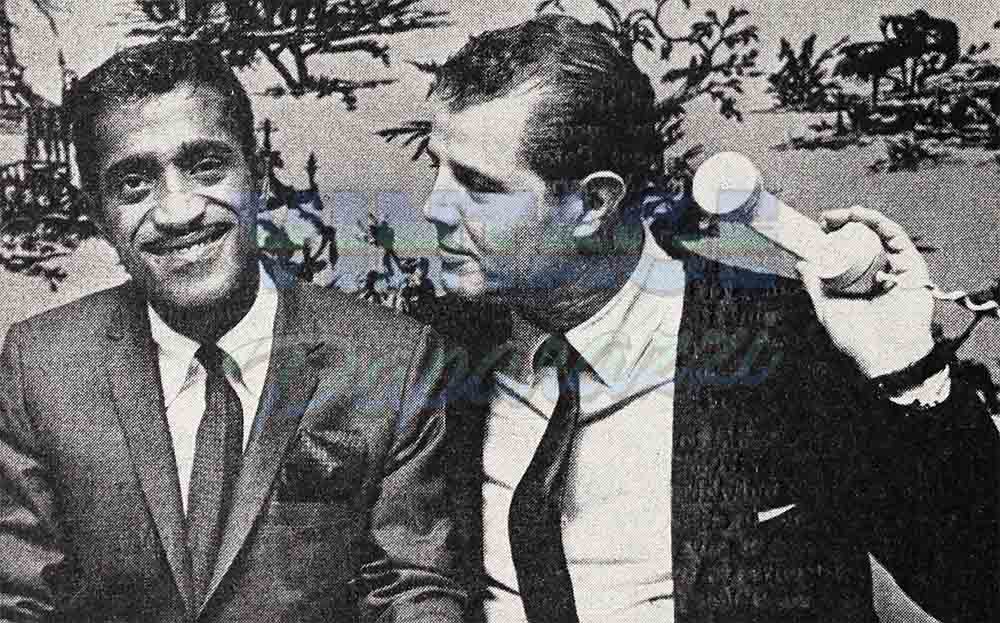
FRED: Are the kids’ rooms decorated any certain way?
SAMMY: No. Very simple. Nothing at all. We had a nurse for a while, and we just have a mother’s helper now. May for the last two weeks has been taking care of the kids all by herself because of the fact that she had to give the woman who has been there time to catch up on days off.
FRED: How big a family do you think you’d like, Sammy?
SAMMY: About six, seven kids.
FRED: Really, that’s something to say, what a different guy you are. Can you notice it yourself?
SAMMY: Well. I think age has something to do with it, too. When we first met each other, the world was my oyster, and it was wild, having had the long and hungry years behind me, and it looked then like a bright horizon—a single guy and you could do all the things you want to do. My wife has said it and I certainly agree. She says, “I’m glad you did all the things you did before we met, and you have them out of your system now.”
I can look at guys now and find them just floundering, and I say, “That’s their problem; it’s not mine any more.”
FRED: Are you looking forward to living in New York again, Sammy, when you do “Golden Boy”?
SAMMY: Oh yes.
FRED: You’ll take an apartment?
SAMMY: For at least two years. We’ll take an apartment close to the theater during the show so I’ll be able to spend as much time as possible at home with May and the kids. I’m really looking forward to it, being able to be in one place for a long time and only having to travel between the apartment and the theater. What a gas that’ll be!
FRED: Where will the kids go to school?
SAMMY: In New York. They will be exposed to everything. May is looking forward to it—she has a great affinity for getting our children involved with others.
FRED: Sam, what about all the controversy over your marriage?
SAMMY: You learn to wear controversy as a person learns to wear a pair of ill-fitting shoes, if that’s the only pair of shoes he has. Out of all the things that I become involved with controversially, there are maybe two or three that I could have stopped and said, “No, I don’t want to do it because it’s controversial.” The rest of the things that I have done I have done because I think I have a right to it as a human being. I’ve got as much right to try to seek happiness in my own way, with whom I choose, so long as I don’t hurt anyone—the only people that stood to be hurt when I got married were my wife and myself. I don’t believe in the bugaboos. I believe you know this. I don’t believe in the bugaboos about what happens to children of a mixed marriage. I think if you walk in my house you will hear the same sounds of happiness that you hear in any house. I think that if you find yourself surrounded by beautiful people—the children are beautiful and thank God they’re healthy, and that’s all we want is healthy children—but I am proud to say, when I look at my daughter, she’s beautiful. Our son is, too.
But do I like it? I have to accept it. I have no choice but to accept it. Because when I want to walk into a place and people say, “There’s Sammy Davis, Jr.”—and automatically that IBM machine up- stairs in their brain starts to work, and they see all the covers of scandal magazines. So that if you’re not doing anything controversial they make you controversial by looking at you. The fact that maybe some of the stories were true (90% of them were not) does not matter to them, but they associate with it. But I must say that even that point of view is better now than it used to be. But to go out and solicit controversy, no. That’s ridiculous, stupid. Nobody can live with that.
FRED: Sammy, I know you’re considered a real expert at the fast draw and you’re a real bug on Westerns. Why do you dig them so much?
SAMMY: So who’s got a better right than the first colored Jewish cowboy in history?
—THE END
It is a quote. PHOTOPLAY MAGAZINE MARCH 1963
AUDIO BOOK




